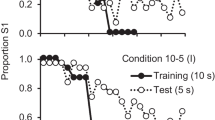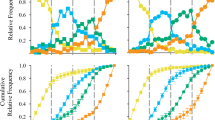Abstract
Pigeons were trained to acquire a new four-response sequence in each session by pecking three keys in a predetermined order. The keys were illuminated by different colors during each step under the chained schedule, but by only one color under the tandem schedule. Under the reset contingency, incorrect responses produced a short timeout and a reset of the four-response sequence to its beginning. Only the timeout was produced by incorrect responses in the non-reset contingency. Under both chained and tandem schedules, the pigeons responding under the reset contingency made fewer errors during the session and had a more rapid within-session error reduction than the pigeons responding under the non-reset contingency. Under both reset and non-reset contingencies, the pigeons made fewer errors under the chained schedules than under the tandem schedules.
Similar content being viewed by others
References
BOREN, J. J. 1963. Repeated acquisition of new behavioral chains. American Psychologist, 17, 421 (abstract).
BOREN, J. J., & DEVINE, D. D. 1968. The repeated acquisition of behavioral chains. Journal of the Experimental A nalysis of Behavior, 11, 651–660.
FERSTER, C. B. 1960. Intermittent reinforcement of matching to sample in the pigeon. Journal of Experimental Analysis of Behavior, 3, 259–272.
FERSTER, C. B., & SKINNER, B. F. 1957. Schedules of reinforcement. New York: Appleton-Century-Crofts.
FRY, W., KELLEHER, R. T., & COOK, L. 1960. A mathematical index of performance on fixed-interval schedules of reinforcement. Journal of the Experimental Analysis of Behavior, 3, 193–199.
NEVIN, J. A., CUMMING, W. W., & BERRYMAN, R. 1963. Ratio reinforcement of matching behavior. Journal of the Experimental Analysis of Behavior, 6, 149–154.
SIDMAN, M., & ROSENBERGER, P. B. 1967. Several methods for teaching serial position sequences to monkeys. Journal of the Experimental Analysis of Behavior, 10, 467–478.
THOMPSON, D. M. 1973. Repeated acquisition as a behavioral baseline for studying drug effects. Journal of Pharmacology and Experimental Therapeutics, 184, 506–514.
THOMPSON, D. M. 1974. Repeated acquisition of response sequences: Effects of d-amphetamine and chlorpromazine. Pharmacology, Biochemistry and Behavior, 2, 741–746.
THOMPSON, D. M. 1975. Repeated acquisition of response sequences: Stimulus control and drugs. Journal of the Experimental Analysis of Behavior, 23, 429–436.
Author information
Authors and Affiliations
Additional information
This research was supported in part by Grant No. DA00570-02 from the NIDA and by a grant from E. Merck, Darmstadt, Germany.
Rights and permissions
About this article
Cite this article
Harting, J., McMillan, D.E. Repeated Acquisition of Response Sequences by Pigeons Under Chained and Tandem Schedules with Reset and Non-Reset Contingencies. Psychol Rec 26, 361–367 (1976). https://doi.org/10.1007/BF03394399
Published:
Issue Date:
DOI: https://doi.org/10.1007/BF03394399




